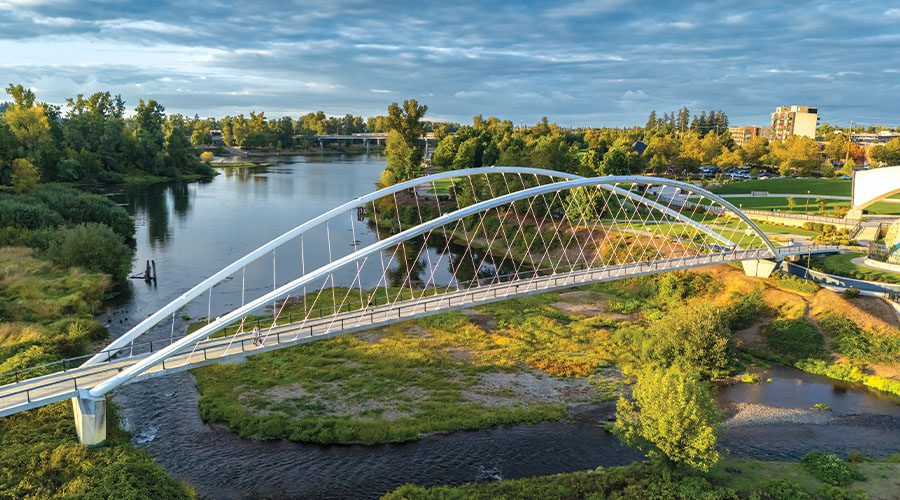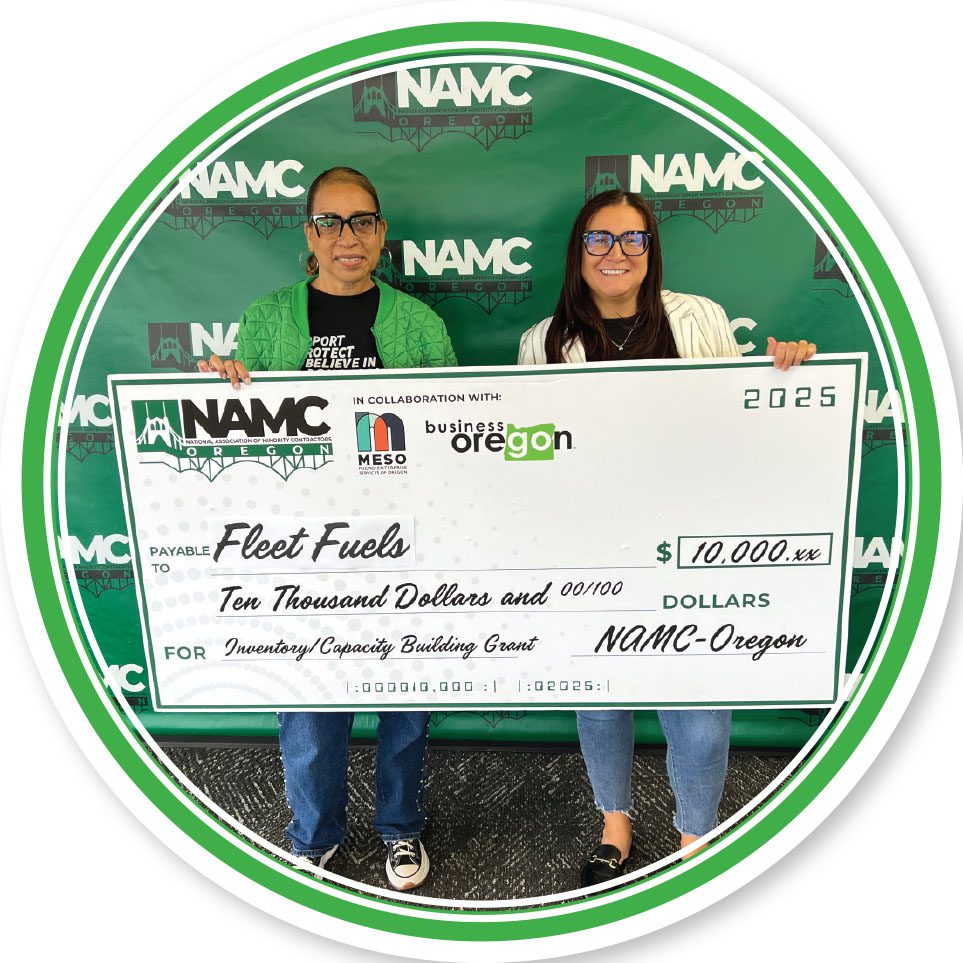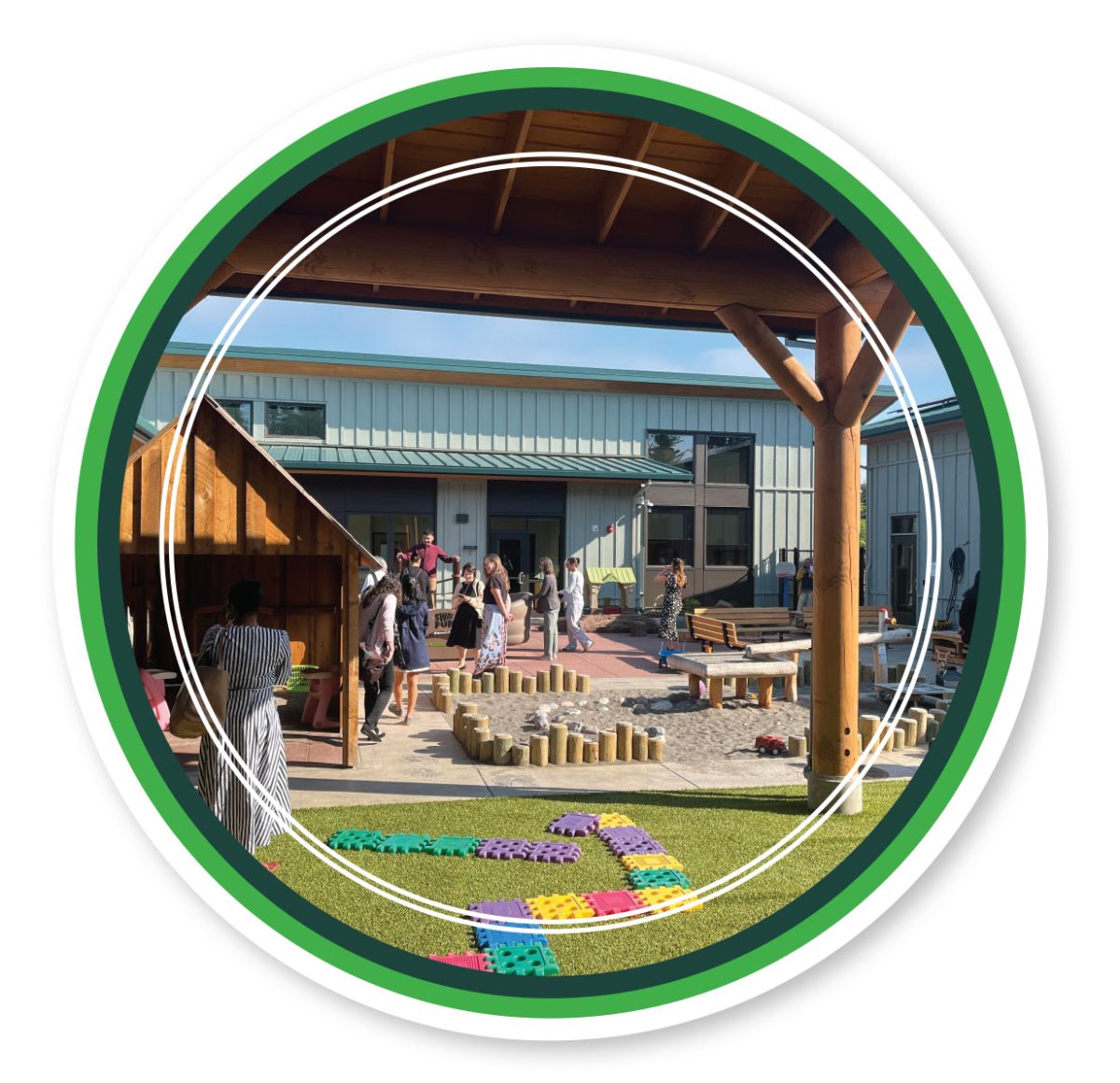By Business Oregon
Oregon has long been recognized for its pioneering spirit—from sustainable agriculture and advanced manufacturing to its thriving tech and creative sectors. In 2025, that spirit is stronger than ever as Business Oregon, the state’s economic development agency, continues to drive innovation while deepening its commitment to rural communities, Tribal partnerships, small business growth, and early learning infrastructure.
Business Oregon’s mission is to support businesses of all sizes and strengthen communities across the state. In 2024, the agency financed 421 projects, delivering more than $375 million to drive growth, support job retention, and enhance quality of life in both urban and rural areas. Ongoing broadband investments are expanding reliable, high-speed internet access to more households and businesses, ensuring that every Oregonian can participate in the digital economy.
With expanded outreach and regional partnerships, Business Oregon has built stronger connections with local leaders, helping communities identify their priorities and position themselves for lasting success.
Innovation with Impact
Oregon’s innovation economy isn’t limited to urban centers—it thrives in every region. Through targeted investments and strategic partnerships, Business Oregon helps startups and established companies alike bring bold ideas to life in fields ranging from clean energy to advanced materials and bioscience.
In 2025, the agency expanded its Innovation and Entrepreneurship programs, committing $19 million over two years to strengthen Oregon’s ecosystem for science and technology startups. This investment supports incubators, accelerators, and entrepreneurial support organizations that fuel job creation, commercialization, and economic resilience.

One standout example is Solid Carbon, a company transforming the concrete industry’s carbon footprint. Concrete production accounts for seven percent of global CO2 emissions, largely due to cement. Solid Carbon tackles this challenge by integrating biochar—a carbon-rich biomass—into concrete, creating a product that sequesters more carbon than it emits.
Business Oregon began supporting Solid Carbon in 2022 with a $242,000 High Impact Opportunity Project grant, helping launch its first carbon-negative product, BioLock, now used in over 2,000 tons of concrete across Oregon in projects like skateparks and housing foundations.
In 2024, the company received funding from the Portland Seed Fund’s Intrepid Oregon Fund, backed by Business Oregon’s $4 million Commercialization Gap Fund, enabling continued research with Oregon State University and the development of new products—BioPozz and BioLock 2.0—set to debut in 2025.
“The environment that you put your team into is absolutely going to affect the outcomes for that team,” said John Mead, Co-founder and CEO of Solid Carbon. “Our environment at Solid Carbon has been made better by funding and support from Business Oregon.”
Additional backing from the ONAMI ToughTech Breakthrough Fund and a $50,000 SBIR/STTR Matching Grant helped Solid Carbon secure further awards from the Department of Energy and National Science Foundation. Beyond its environmental benefits, the company is creating jobs and building a manufacturing facility in Oregon, reinforcing the state’s leadership in sustainable innovation.
Supporting Small Businesses Statewide
Small businesses remain the backbone of Oregon’s economy. In 2025, Business Oregon received its second tranche of $29 million through the State Small Business Credit Initiative (SSBCI) to expand access to capital via loans, guarantees, and equity investments. Altogether, SSBCI will deliver $84 million in direct support to Oregon small businesses and leverage an additional $100 million in private investment—helping entrepreneurs overcome financial barriers to growth.
Business Oregon also works closely with local technical assistance providers, lenders, and community organizations to ensure entrepreneurs—especially those in historically underserved areas—have the tools and mentorship they need. From export assistance to capacity-building grants, these programs are designed to meet business owners where they are.
A recent example is Fleet Fuels LLC, a BIPOC-owned petroleum and renewable fuel marketer operating in Oregon and Southern Washington. Partnering with the National Association of Minority Contractors (NAMC), Business Oregon awarded Fleet Fuels a $10,000 grant to upgrade aging equipment essential to their operations.
“Your support is instrumental in strengthening our operations and fueling our continued growth,” said Don Shanklin, Owner of Fleet Fuels. “These improvements will also help us implement more sustainable practices, aligning with our long-term commitment to environmental responsibility.”
NAMC is one of several partners supported through Business Oregon’s Technical Assistance for Underrepresented Businesses program, which ensures equitable support for minority-owned and disadvantaged businesses statewide. Providers are selected every two years through a competitive process to maximize accessibility and quality of assistance.
Rural Oregon: Investing in Resilience
Although just 17 percent of Oregonians live in rural areas, 66 percent of Business Oregon’s 2024 investments went to rural projects. From industrial site readiness and water infrastructure to broadband expansion and child care, these efforts ensure rural communities share in the state’s prosperity.
A key example is the Northwest Ninth Street Neighborhood Infrastructure Project in Florence, which unlocks land for affordable housing and co-located child care in an area classified as a “child care desert.” Funded through a direct legislative appropriation and supported by Business Oregon, the project illustrates how infrastructure investments can spark inclusive, community-driven development.
Through the Rural Opportunity Initiative (ROI), Business Oregon also partners with local organizations to build entrepreneurial ecosystems that reflect each region’s strengths—from outdoor gear manufacturing in the Columbia Gorge to food innovation in the Willamette Valley.
Another signature investment is the Warm Springs Commissary Project, a multi-year collaboration with the Warm Springs Community Action Team. With a total cost of $8 million, including over $3 million in Tribal and regional contributions, the project will transform a historic 1896 storehouse into a community hub with a commercial kitchen, food cart pavilion, and retail space for Tribal entrepreneurs.
“The Commissary will strengthen our local economy and foster a deeper sense of community and belonging,” said Julie Quaid, Board President of the Warm Springs Community Action Team. Once completed, the site will serve as a key stop between Portland and Central Oregon, revitalizing the historic Agency area and reclaiming a building that once symbolized dependence into one that represents sovereignty and self-determination.
Tribal Partnerships: Economic Development with Sovereignty
Business Oregon continues to strengthen relationships with Oregon’s nine federally recognized Tribes, honoring sovereignty while supporting shared economic goals. In 2025, the agency expanded its Tribal Enterprise Zone program and provided technical assistance for Tribal-led infrastructure, renewable energy, and tourism projects. These partnerships have led to new investments in workforce development, entrepreneurship, and cultural preservation.
One recent success is the Nixyáawii Community Financial Services (NCFS) food truck initiative. Supported by a $400,000 Economic Equity Investment Program grant, NCFS used $35,000 to purchase and equip a food truck that will be leased to aspiring entrepreneurs. The project offers hands-on experience for Native and rural business owners to test concepts and refine business plans in a real-world environment, lowering barriers to entry in the growing food industry.
Building Oregon’s Child Care Infrastructure
Expanding access to high-quality childcare remains one of Oregon’s most pressing needs. Business Oregon’s Child Care Infrastructure Fund Program, established under House Bill 3005 (2023), provides grants and loans to support childcare facility construction, renovation, and expansion. Backed by $50 million in lottery bonds approved by the Oregon Legislature and Governor Tina Kotek, the program has already awarded $30 million to 121 childcare providers across 30 counties. Another $20 million will be distributed in late 2025.
“Every Oregon family deserves access to affordable, high-quality childcare, no matter where they live,” said Governor Kotek. “This funding will expand vital childcare options statewide, helping ensure Oregon’s future is strong and equitable.”
Among recipients, the Confederated Tribes of Grand Ronde received $2 million to construct a new 25,000-square-foot childcare facility serving more than 160 children ages 0–5. The center features twelve classrooms, age-specific play areas, and culturally inspired design elements that honor the Grand Ronde community. This investment supports the Tribe’s commitment to early learning and strengthens the region’s family infrastructure.
Looking Ahead
As Oregon looks to the future, Business Oregon remains focused on building an economy that is innovative, inclusive, and rooted in place. Whether supporting a startup in Portland, a childcare center in Coos Bay, or a Tribal enterprise in Warm Springs, the agency is committed to helping communities thrive—one partnership, one investment, and one bold idea at a time.
For more information on Business Oregon’s programs and impact, visit www.oregon.gov/biz.






